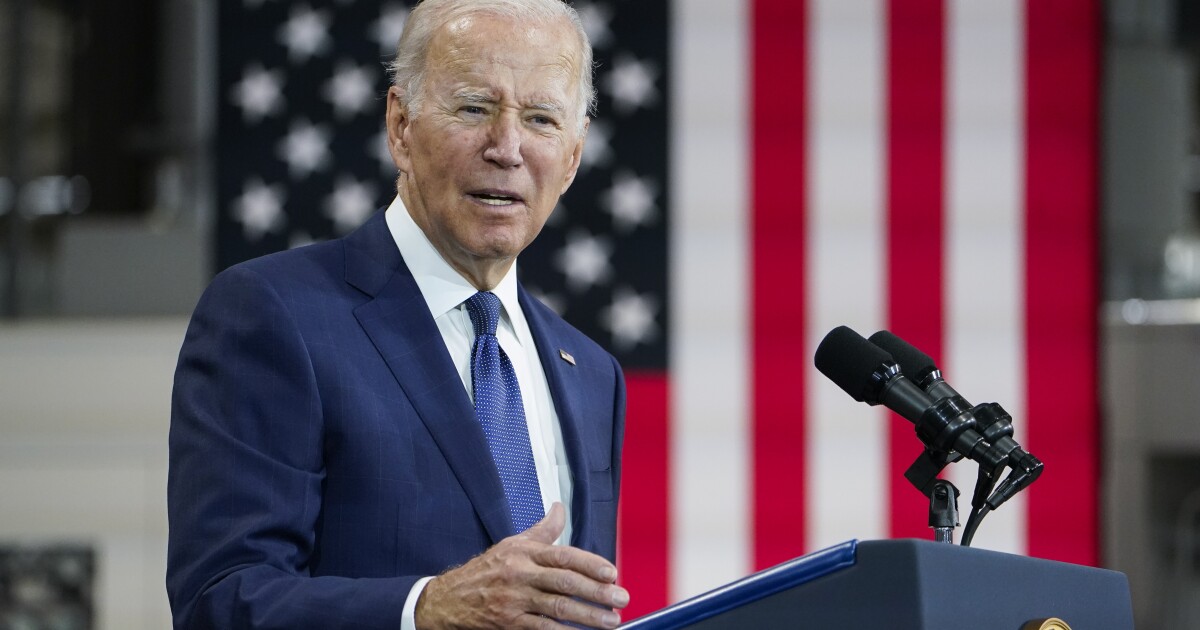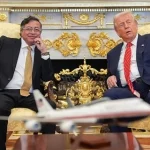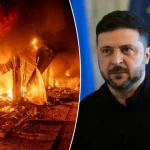

Russian President Vladimir Putin‘s indiscriminate missile strikes on Ukraine present a new challenge for President Joe Biden seven-and-a-half months into the war.
Days after comparing Putin’s nuclear threats to the 1962 Cuban missile crisis and the biblical Armageddon, Russia’s strikes on Ukraine in retribution for an attack on the Russian-Crimean peninsula Kerch Bridge escalates the conflict as the prospect of an energy crisis this winter tests the resolve of Biden’s allies.
WHITE HOUSE BRACES FOR LATEST HUNTER BIDEN FALLOUT NEAR ELECTIONS
Unless Biden reacts to Russia’s missile strikes with “real determination,” he risks Putin “escalating further, potentially even to nuclear weapons,” according to former NATO Assistant Secretary General for Defense Investment Marshall Billingslea.
“We urgently need to deliver the more sophisticated weaponry that Ukraine has been asking for that, to date, the Biden administration has refused to provide,” Billingslea said, naming long-range HIMAR artillery system ammunition as an example. “The second facet of the response needs to be designation of Russia as a state sponsor of terrorism and an immediate clamp down on the energy trade with the Russians.”
Billingslea agreed Biden should restrict Ukraine from using U.S. weapons and equipment against “Russia proper.” But the former Trump administration alumnus and Vandenberg Coalition advisory board member underscored that “legitimate military targets in Crimea are not in Russia.” He also described Biden’s sanctions against Russia as being “far short of any type of maximum economic pressure” in contrast to President Donald Trump’s Iran or Venezuela measures, citing Biden’s Russian energy carve-outs.
Cato Institute defense senior fellow Eric Gomez encouraged Biden to reevaluate his “war aims” and to communicate better what concessions Putin can exchange for sanction relief after the strongman launched more than 80 Russian missiles and 20 Iran drones on Ukraine, hitting playgrounds and roads during rush-hour traffic in Kyiv to Lviv.
Gomez contended Putin is making it more difficult for himself to negotiate a peace settlement after he mobilized 300,000 army reservists with training and experience and annexed contested territory in Ukraine’s east and south. Simultaneously, Ukrainian President Volodymyr Zelensky has little incentive to speak with his Russian counterpart after the missile strikes, which killed 14 people and injured almost 100, in what is a fight for “national survival,” though battlefield conditions could change.
“I sympathize with my friends in the restraint movement, who talk a lot about wanting a diplomatic end to the conflict,” Gomez said. “I think that won’t happen unless both sides don’t really see an advantage to keep fighting, but it’s clear that both sides want to.”
Putin has proven he is not prepared to take off-ramps created for him with the missile strikes, added Dan Hamilton, a Brookings Institution foreign policy nonresident fellow.
“It’s not an off-ramp, but it is a different way to engage, [and that] is for the U.S. to quietly discuss [with] the Russians whether they would like to resume some discussions about nuclear arms control,” he said from Germany. “Putin had said something earlier about limiting our intermediate-range forces. The controls on those expired under the INF Treaty.”
For Hamilton, Tuesday’s emergency G-7 meeting, in which Zelensky is also expected to participate, will address infrastructure security concerns after the sabotage of the energy Nord Stream 1 and Nord Stream 2 pipelines, as well as Germany’s railway system, in addition to Monday’s missile strikes, more sanctions, and a possible Russian oil and natural gas price cap.
“We’ve entered this age of disruption, in which many of the arteries that connect our societies and keep our societies moving are susceptible to this type of disruptive shutdowns and even military assaults,” he said. “We’re in a multi-front war. … Putin is weaponizing food. He’s weaponized people, refugees.”
Billingslea criticized the price cap proposal as “performative art” because it is “unenforceable” and China and India are “absolutely” not committed to it. It also provides “a pretext” for the EU to continue purchasing Russian energy amid dependence and supply issues.
The G-7 meeting coincides with this week’s gathering of NATO defense ministers in Brussels, Belgium, on Thursday. The Ukraine Defense Contact Group, a U.S.-led organization of 50-odd countries, is also convening at Ramstein Air Base in Germany the day before.
“The United States strongly condemns Russia’s missile strikes today across Ukraine,” Biden wrote in a statement on Monday. “These attacks killed and injured civilians and destroyed targets with no military purpose. They once again demonstrate the utter brutality of Mr. Putin’s illegal war on the Ukrainian people.”
CLICK HERE TO READ MORE FROM THE WASHINGTON EXAMINER
Biden urged Democratic donors last week not to underestimate Putin’s rhetoric, repeating he is “not joking” about the Russian leader deploying tactical nuclear, biological, or chemical weapons. “I don’t think there’s any such thing as an ability to easily lose a tactical nuclear weapon and not end up with Armageddon,” Biden said at the time.







